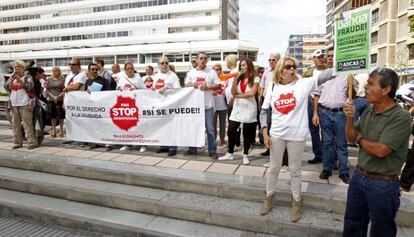Under the judges' shield
Citizens are increasingly turning to the courts to change the course of politics

The law is interpreted through the prism of social reality. It is not just what is happening, but what the Spanish civil code stipulates. An increasing number of judges are drawing lines in the sand over certain policies and abuses. In this time of economic and social crisis, the law, and those that impart it, are the final frontier. "There is a margin for interpretation and mechanisms that can be sought," say several magistrates when asked about the political context of their role.
Evictions, the scandal over preferential shares sold to bank customers, political pardons, privatizations and rampant corruption are some of the themes judges have decided to impose their powers upon; despite the public perception that the law is far from equal for everyone, several high-profile politicians, bankers, public figures and even the king's daughter have found themselves put on the stand.
"Nobody is untouchable," says the chief judge in Málaga, José María Páez.
"Judges do not practice politics; we carry out controls of legality over politics," notes José Luis González Armengol, the chief judge in Madrid. One of the recent results of this control was the rejection of the Popular Party (PP) regional government's plan to privatize several hospitals. Tens of thousands of people took to the streets of the capital to protest against the plan, but it wasn't until the courts imposed a stay on proceedings that the politicians backed down.
People see us as a defensive wall against a crisis that's breaking over them"
The tide of evictions sweeping the country has also brought people out in defense of their rights, and the rights of others. While the floor of Congress bore witness to a debate on the modification of certain aspects of repossession legislation - and some regional authorities introduced their own, only to see them quashed by the majority PP - magistrates took matters into their own hands. A movement to put the brakes on evictions emerged and finally a Barcelona judge, José María Fernández Seijo, took a case to the European Union and won on the basis that the affected persons' mortgage agreement was abusive. It was a significant victory; Brussels sided with Fernández because Spanish laws on consumer protection were not in line with European diktats.
"In those areas where governments are slow, judges can modify parameters of interpretation and get closer to society," Fernández says.
"Justice is at a vital crossroads to determine whether it can function in difficult times, as is demanded of it," says the chief judge of Valencia, Pedro Viguer. "Right now we have more work than ever and more to prove."
It was the justice system that acted against the banks in the preferential shares scandal, in which individual investors were hard-sold complex financial products. The courts ordered the life savings of working class people who had been duped to be returned.
"We're just doing our job," say several magistrates, playing down the important advantage that judicial power holds over legislative procedure in many of the issues affecting the Spanish citizenry at large.
In other cases it has been an entire judicial panel that has acted to overturn an unpopular decision. This occurred in the case of a man who was controversially pardoned by the government after being sentenced to 14 years for killing a motorist when driving the wrong way along a highway. The so-called "kamikaze" driver, Ramón Jorge Ríos Salgado, was represented by the brother of a PP deputy. The Supreme Court quashed the pardon in November.
Are judges moving closer to society, or is society placing greater trust in the justice system. Many say the convergence is mutual. "I am careful when it comes to attributing credit. What is happening is that judges are becoming far more accessible and the majority of us have our doors open," says Alfonso González-Guija, chief judge in Bilbao. "The crisis has created such dramatic situations that people are approaching whoever they can and the politicians are more and more distant."
"People see us now, for the first time, as a defensive wall against a crisis that is breaking over them," says Lourdes Menéndez, a judge in Madrid who prevented an eviction on the basis of the rights of minors.
One of the reasons for the new partnership of judge and citizen is that the latter are increasingly aware of their rights. "They know they can go to court and win," says Pablo Fernández de la Vega, a magistrate in Cantabria who filed the first-ever challenge against court fees charged to plaintiffs - after a suit lodged by a member of the public - on the basis of unconstitutionality.
Tu suscripción se está usando en otro dispositivo
¿Quieres añadir otro usuario a tu suscripción?
Si continúas leyendo en este dispositivo, no se podrá leer en el otro.
FlechaTu suscripción se está usando en otro dispositivo y solo puedes acceder a EL PAÍS desde un dispositivo a la vez.
Si quieres compartir tu cuenta, cambia tu suscripción a la modalidad Premium, así podrás añadir otro usuario. Cada uno accederá con su propia cuenta de email, lo que os permitirá personalizar vuestra experiencia en EL PAÍS.
¿Tienes una suscripción de empresa? Accede aquí para contratar más cuentas.
En el caso de no saber quién está usando tu cuenta, te recomendamos cambiar tu contraseña aquí.
Si decides continuar compartiendo tu cuenta, este mensaje se mostrará en tu dispositivo y en el de la otra persona que está usando tu cuenta de forma indefinida, afectando a tu experiencia de lectura. Puedes consultar aquí los términos y condiciones de la suscripción digital.









































